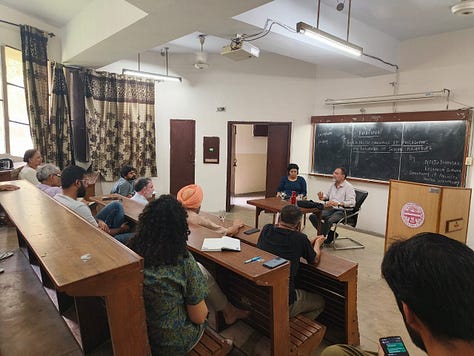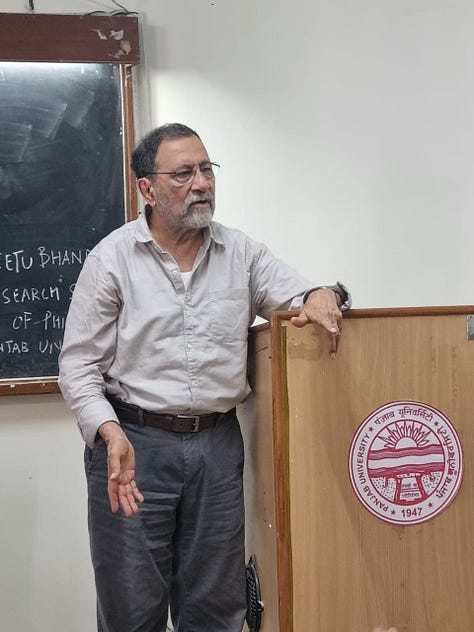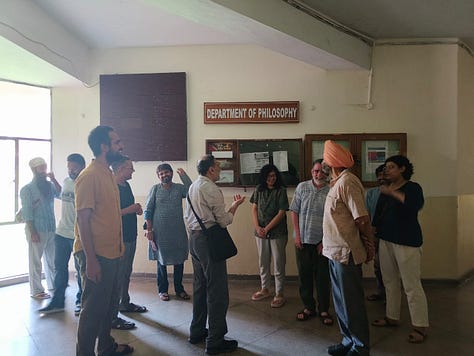~ Applications are closed ~
Please see the course details below.
Some of the most significant technological innovations of the twentieth century that revolutionised food, agriculture, energy, global supply chains, pharmaceuticals, internet and digital technology, arose out of military research. Nation-States the world over spend the largest parts of their annual budgets on the military. ‘Defence’ research is among the biggest employers of scientists and engineers worldwide. Armed conflict and militarist ideology occupy an important place not just in global institutions but the collective psyche. We have a war on drugs, a war on terror, a war on poverty, a war on diseases and a war on nature. Today videos from war zones have become social media content. How did we get here?
From the rise of European trading companies to the wars of the 20th Century, global events have shaped the contemporary world, including India. Concepts and ideologies linked to those events have influenced us in no small measure. When BR Ambedkar spoke at Mahad against caste discrimination in 1927, he asked his audience to keep in mind the French Revolution of 1789. It was from the French Revolution that the political categories of ‘Left Wing’ and ‘Right Wing’ emerged. Ideas such as ‘Liberty, Equality, Fraternity’ and political categories such as ‘Liberal’, ‘Conservative’ and ‘Socialist’, emerging from the European experience continue to influence the way we think about public issues in India today.
Public vocabulary today is loaded with strong ideological accents, marked by terms such as Communist, Capitalist, Nationalist, Traditionalist, Modernist etc. Dialogue across these ideological lines is becoming rarer by the day. Each ideology has its ‘narrative’ and the common ground of truth seems to be receding. In many ways our collective decisions mimic old patterns. Understanding these patterns and the larger contexts that shaped our memories might help us look at the present more clearly. This course will trace the history of some of the important global events and ideas that shape our present condition.
Prof. Dilip Simeon is a historian and a teacher with five decades of teaching experience. He has taught at Ramjas College (University of Delhi); at Ashoka University; and campuses abroad. His doctoral thesis was on the history of the labour movement of metallurgical workers and miners in Jharkhand. He is the author of the novel, Revolution Highway. Prof Simeon is someone who has engaged with the churn of the radical ideologies of our time, through lived experience as well as academic contemplation. The Recollection course will engage with important events and ideas of the first half of the twentieth century.
Note from the Teacher: Recollection
‘We learn history not in order to know how to behave or how to succeed, but to know who we are’: Leszek Kołakowski, The Idolatry of Politics
‘History is the odyssey of the unhappy consciousness’: Stanley Rosen, G.W.F. Hegel: An Introduction to the Science of Wisdom
Elie Halevy's book on the Great War of 1914-1918 and its aftermath is named The Era of Tyrannies: Essays on Socialism and War (1938). His interpretation included the emergence of militant populism, the nationalisation of economies, and the upsurge of nationalist ideologies among ‘the peoples.’ But how did we get here? The Recollection lectures will address this question.
Among other things, this course will include a survey of major developments in the first half of the twentieth century as something unprecedented in their significance for global society. The events we shall study include the collapse of multinational empires; the reorganisation of the world order; the rise of militarist nationalism and economic autarky, and the emergence of despotic regimes. They will include the Great War; the Bolshevik Revolution and the consolidation of the USSR; the rise of Fascism and Nazism; the crises of the 1930's (the Great Depression, the Spanish Civil War, the Chinese Revolution, and the Sino-Japanese conflict); and World War Two, the last imperial war.
The post-war partitioning of nations was not just an Indian calamity, it happened to Korea, Palestine, Germany, China and Vietnam as well. So was the massive relocation of populations, accompanied by the rendering of millions of people ‘stateless refugees.’
I will also introduce the concept of ideology; along with its manifestations.
Course Content
This introductory course will broadly cover four themes. Each series requires deeper and prolonged study. In this preliminary-level course we will touch on all the themes briefly so as to cover more ground and plan advanced studies at a later stage. Detailed notes will be provided.
Theme One: Introduction
What is implied in our title, Recollection? Does history possess meaning, and what does it mean to understand it? Are we going somewhere? Is it true to say there are no historical facts, only interpretations? What is the fact/value dichotomy? Since all religions posit an origin myth and engage with the purpose of life; what then is the dividing line between philosophy and theology, and between time and eternity? How does all this relate to political utopia?
Theme Two: The French Revolution till 1900: a brief survey
The French Revolution is a watermark in the history of modern society and inaugurated the age of ideology. It also resulted in the first ‘total war’, which lasted from 1792 until 1815; and cost millions of lives. The nineteenth century, it is said, transpired in the shadow of 1789. The industrial revolution, wars of national unification, the socialist movement and working class awakening all took place during the nineteenth century.
Theme Three: Empire, Utopia and War in the Twentieth century
‘It seemed to us that we were witnessing a total break in the evolution of mankind, the complete collapse of man as a rational being’; Heda Margolius Kovály, Under a Cruel Star: A Life in Prague 1941–1968
This section will study the global crisis from 1911 until 1949, when the Chinese civil war ended and the People’s Republic of China was founded. The period includes the events mentioned in the introduction above; and will flow into a few post-war developments, including the founding of the UNO and global economic institutions. It will also cover the origins of the Cold War.
Theme Four: Philosophy, theory and ideology
The faintest of all human passions is the love of truth: A. E. Housman (1859-1936)
This section will study important theoretical and philosophical currents of the period 1900 to 1945, These include political theology, romantic nationalism, existentialism, historicism and the perversions of law and justice. Thinkers will include Sigmund Freud, Georges Sorel, Lenin, Carl Schmitt, Martin Heidegger, Hannah Arendt, Ernst Junger, Leo Strauss and Mohandas Gandhi.
Course Format
This course will consist of lectures and discussions. There will be eight lectures in total. On the day of the class, we will begin at 9:00 AM and end at 1:30 PM. Each meeting will have two hours of lecture with a break and an hour of additional time for questions and discussion.
There will be preparatory reading to be done before the course begins. In addition, for every class there will be reading material to be covered by the students before attending the class. Each class will build on the previous one, therefore, it is mandatory for participants to attend all the lectures in this course. If you are signing up for this course, please make sure that you are available on all the dates. If not, kindly allow someone else to attend.



Dates and Venue
The course will be held in Vasant Kunj, Delhi. Nearest metro stations to the venue are Chhatarpur on the Yellow Line and Aerocity on the Airport Express Line.
The course will start on 5th August and end on 27th August, 2025. Classes will be held every Tuesday and Friday. The schedule of classes is as follows:
Week 1: 5th August Tuesday, 8th August Friday
Week 2: 12th August Tuesday, 15th August Friday
Week 3: 19th August Tuesday, 22nd August Friday
Week 4: 26th August Tuesday, 29th August Friday
Cost and Fees
The Pagdandi Collective runs from the gifts (time, money and resources) of its well wishers. It is not run as a commercial business. We will continue to function as long as people feel we should be supported.
This gathering is offered as a gift from well wishers and those who have attended our programs before. After the completion of the course, you may offer your support in the form of Dakshina as per your wish and in whatever form. You may also support us in organising future programs and help us continue our work.
Organising a course like this typically involves a money cost of Rs 15,000 per person and is made possible due to the time, resources and wisdom contributed by a number of teachers, organisers and volunteers.
If you are unable to attend this course, consider making a contribution towards organising this course. To do so, you may send a contribution to the UPI number 9310545026 or get in touch with us at pagdandi.collective@gmail.com
Preparation
This is a fairly demanding academic course and requires reading before, during and after the course. It is mandatory to attend the entire course from start to finish. We will share a list of reading material which you will be required to study before the course begins. In addition, there is some reading you need to do before applying for the course, which is mentioned below.
How to Apply
We have a limited number of seats in this program. This is an intensive course which will require some preparation. Please read any one of the following essays before you fill the application form. Participants will be selected on the basis of their reflection from the reading.
To apply for the course, click here. Last date to apply is 6th July, 2025.
Our Previous Offerings
To know more about the courses and programs we have offered in the past, please see the link below.
Contact
For more information, you may write to us at pagdandi.collective@gmail.com
If you would also like to support our work, please reach out to us over email. To send a contribution, please use the UPI number 9310545026 (please mention ‘for pagdandi: recollection’) or get in touch for bank details.
FAQs
Will I receive a certificate at the end of this course?
No, this is not a certificate course. We welcome students who are keen to learn and have a curiosity for history and philosophy.
Is there a fees to enroll for this course?
No, there is no fees to enroll. The course is offered as a gift. You are welcome to support our work and help us continue offering such programs. At the end of the course, you may offer a gift. You may also become a patron by continuing to support our work in the long term.
I cannot attend all the eight lectures. Can I attend some of the classes?
If you sign up for this course, it is compulsory to attend all the lectures. It is not possible to attend a part of the course.
Can I attend this course online?
No, it is not possible. This course is offered in a physical location in Delhi and face to face interaction is an important part of the program.





